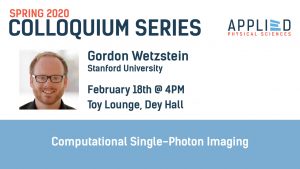
- This event has passed.
Colloquium Series: Gordon Wetzstein (Stanford University)
Tuesday, February 18, 2020 @ 4:00 pm - 5:00 pm
 Join us for another event in the 2019-2020 Colloquium Series as APS welcomes Gordon Wetzstein, PhD. to present on his recent research. Gordon Wetzstein is an Assistant Professor of Electrical Engineering and, by courtesy, of Computer Science at Stanford University. He is the leader of the Stanford Computational Imaging Lab and a faculty co-director of the Stanford Center for Image Systems Engineering. At the intersection of computer graphics, machine vision, optics, scientific computing, and applied vision science, Prof. Wetzstein’s research has a wide range of applications in next-generation imaging, display, wearable computing, and microscopy systems. Prior to joining Stanford in 2014, Prof. Wetzstein was a Research Scientist in the Camera Culture Group at MIT. He received a Ph.D. in Computer Science from the University of British Columbia in 2011 and graduated with Honors from the Bauhaus in Weimar, Germany before that. He is the recipient of an NSF CAREER Award, an Alfred P. Sloan Fellowship, an ACM SIGGRAPH Significant New Researcher Award, a Presidential Early Career Award for Scientists and Engineers (PECASE), a Terman Fellowship, an Okawa Research Grant, the Electronic Imaging Scientist of the Year 2017 Award, an Alain Fournier Ph.D. Dissertation Award, and a Laval Virtual Award as well as Best Paper and Demo Awards at ICCP 2011, 2014, and 2016 and at ICIP 2016.
Join us for another event in the 2019-2020 Colloquium Series as APS welcomes Gordon Wetzstein, PhD. to present on his recent research. Gordon Wetzstein is an Assistant Professor of Electrical Engineering and, by courtesy, of Computer Science at Stanford University. He is the leader of the Stanford Computational Imaging Lab and a faculty co-director of the Stanford Center for Image Systems Engineering. At the intersection of computer graphics, machine vision, optics, scientific computing, and applied vision science, Prof. Wetzstein’s research has a wide range of applications in next-generation imaging, display, wearable computing, and microscopy systems. Prior to joining Stanford in 2014, Prof. Wetzstein was a Research Scientist in the Camera Culture Group at MIT. He received a Ph.D. in Computer Science from the University of British Columbia in 2011 and graduated with Honors from the Bauhaus in Weimar, Germany before that. He is the recipient of an NSF CAREER Award, an Alfred P. Sloan Fellowship, an ACM SIGGRAPH Significant New Researcher Award, a Presidential Early Career Award for Scientists and Engineers (PECASE), a Terman Fellowship, an Okawa Research Grant, the Electronic Imaging Scientist of the Year 2017 Award, an Alain Fournier Ph.D. Dissertation Award, and a Laval Virtual Award as well as Best Paper and Demo Awards at ICCP 2011, 2014, and 2016 and at ICIP 2016.
Title: Computational Single-photon Imaging
Abstract: Time-of-flight imaging and LIDAR systems enable 3D scene acquisition at long range using active illumination. This is useful for autonomous driving, robotic vision, human-computer interaction and many other applications. The technological requirements on these imaging systems are extreme: individual photon events need to be recorded and time-stamped at a picosecond timescale, which is facilitated by emerging single-photon detectors. In this talk, we discuss a new class of computational cameras based on single-photon detectors. These enable efficient ways for efficient depth sensing, non-line-of-sight imaging (i.e., looking around corners), imaging through scattering media as well as other unprecedented imaging modalities.


